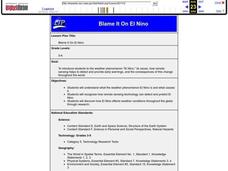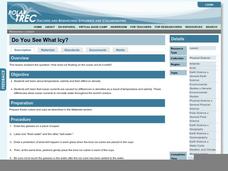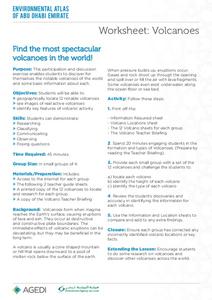Curated OER
How to Float an Egg
Use the scientific method to experiment with an egg. Your class can examine buoyancy and density by finding how many spoons of salt are needed to float an egg. They can predict, experiment, record data, and analyze results.
Curated OER
Going...Going...
Students investigate equilibrium in erosion and deposition by predicting effects of moving water on soil; modeling an erosion simulation; observing results of a test; inferring causes and effects, and hypothesizing about erosion variables.
Green Education Foundation
How Loud is Too Loud?
Ever wonder how loud a sound has to be to cause damage? Young scientists explore sound properties by researching decibel levels. They discuss how sound is perceived by our ears and our brains and why it can cause negative health effects...
Curated OER
Blame It On El Nino
Students study the weather phenomenon El Nino is and what causes it, and recognize how remote sensing technology can detect and predict El Nino. Students discover how El Nino affects weather conditions throughout the globe through research.
Curated OER
Antibiotic Attack
Students examine how antibiotics work and why they are effective. In this antibiotic lesson, students discover that when harmful germs get inside the body, the immune system may not be strong enough to fight the germs off. Students play...
Curated OER
Sunrise/Sunset
Third graders discovver what causes the dramatic colors of a sunset by seeing the changing color of light as it passes through a clear container of water to which milk is gradually added. They measure the liquids and observe what happens...
Curated OER
SCHOOLYARD SUNDIAL
Students study the apparent motion of the Sun in the sky over the course of a day and a year, and analyze what causes seasons on Earth. They participate in a project that has both a science as well as an art component.
Curated OER
Peregrine Falcon
Young environmentalists study the effects that pesticides have on birds, such as the peregrine falcon. They also look at predator/prey interactions. Some wonderful in-class activities accompany an inventive instructional activity. After...
Curated OER
Erosion in Different Soils
Fourth graders observe and identify the effects of weathering and geological activities. They take part in an excellent hands-on group activity called "Erosion Race," in which each group tries to simulate erosion of soil in the quickest...
Curated OER
Agents of Erosion
Fourth graders observe and identify the effects of geological activities and weathering on Earth's surface. They also take a look at reports of events such as storms, earthquakes, floods, and volcanoes. There is a hefty hands-on activity...
Curated OER
Weathering and Erosion
Fourth graders take a look at the effects of weathering and other geologic activities found in the environments in which they live. Along with a guided geologic walk outside of campus, there is also an effective in-class demonstration of...
Curated OER
Erosion... Can You Fight It?
Students study erosion and its effects on shorelines. In this erosion lesson plan, students work in an engineering team to design a seawall and submit a cost bid to their teacher. Students must determine the energy of a wave and design a...
Polar Trec
Do You See What Icy?
Here is a lesson that kicks off with a question. "How does ice floating on the ocean act as it melts?" As learners investigate this natural phenomenon, they'll discover that it has a lot to do with temperature, salinity, and the effect...
Curated OER
Simple Machines III - Pulleys
The principles behind pulleys, levers, and simple machines are the focus of a science lesson. In it, learners take part in a whole-class activity. There are two groups of pupils who each must lift objects with fixed pulleys and multiple...
Environment Agency - Abu Dhabi
Find the Most Spectacular Volcanoes in the World!
Heat things up in your earth science class with this collaborative lesson on volcanoes. After first being introduced to the different types of volcanoes and how they are formed, young geologists work in small groups to research the...
National Wildlife Federation
Why All the Wiggling on the Way Up? CO2 in the Atmosphere
The climate change debate, in the political arena, is currently a hot topic! Learners explore carbon dioxide levels in our atmosphere and what this means for the future in the 11th installment of 12. Through an analysis of carbon dioxide...
Lakeshorelearning
Read and Write about It
Reading informational text is a skill that transcends subjects and grade levels. Practice reading about different topics in various formats with a language arts lesson that includes opportunities for writing and research as well.
Curated OER
The Heat Is On- Spread the Word
Young scholars research global warming. In this environmental lesson, students research global warming on the Internet and create a project to share their knowledge with others. Young scholars present their projects to their peers.
Curated OER
Caring for the Land
Fifth graders examine how to care for the land. In this soil management lesson, 5th graders participate in a service learning project and assist in the preservation of natural resources.
Curated OER
Scientific Method Experiment: Factors Affecting How Ice Melts
Students demonstrate the scientific method by conducting an ice cube melting experiment. They make predictions and observations, and conclude what factors make ice melt more slowly or quickly than normal.
Curated OER
Scientific Method: How Many Drops of Water Fit on a Coin?
Young investigators conduct an experiment using the scientific method. They see how many drops of water fit on a coin; have them conduct several different trials. This involves making a hypothesis, looking at controls, and introducing...
Curated OER
Molly Pitcher -- "Out of Many, One"
Young scholars research, brainstorm and analyze the events that lead up to the Revolutionary War. They critique a piece of artwork depicting a scene from the Revolutionary War. Each major battle is plotted on a map to show a visual...
California Academy of Science
Climate Change Impacts
Getting kids thinking about climate change now, will hopefully push them into action when they become adults. Young environmentalists discuss the evidence and causes of climate change seen in the state of California. They brainstorm ways...
California Academy of Science
Discovering Rainforest Locations
How many rainforests are there, where are they, and do global factors effect their locations? These are great questions that have great answers. Children in grades four through eight use several different maps to determine why...

























